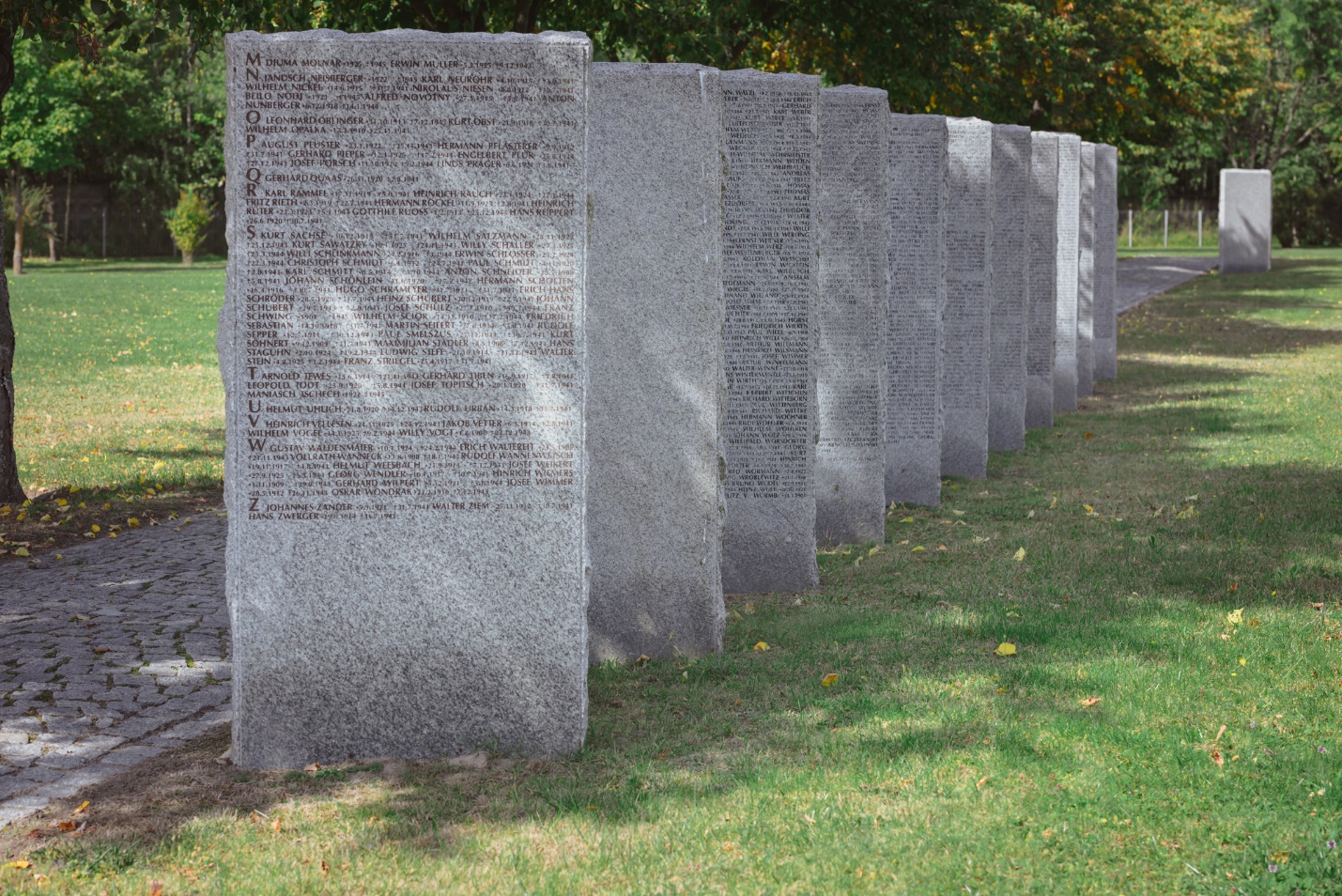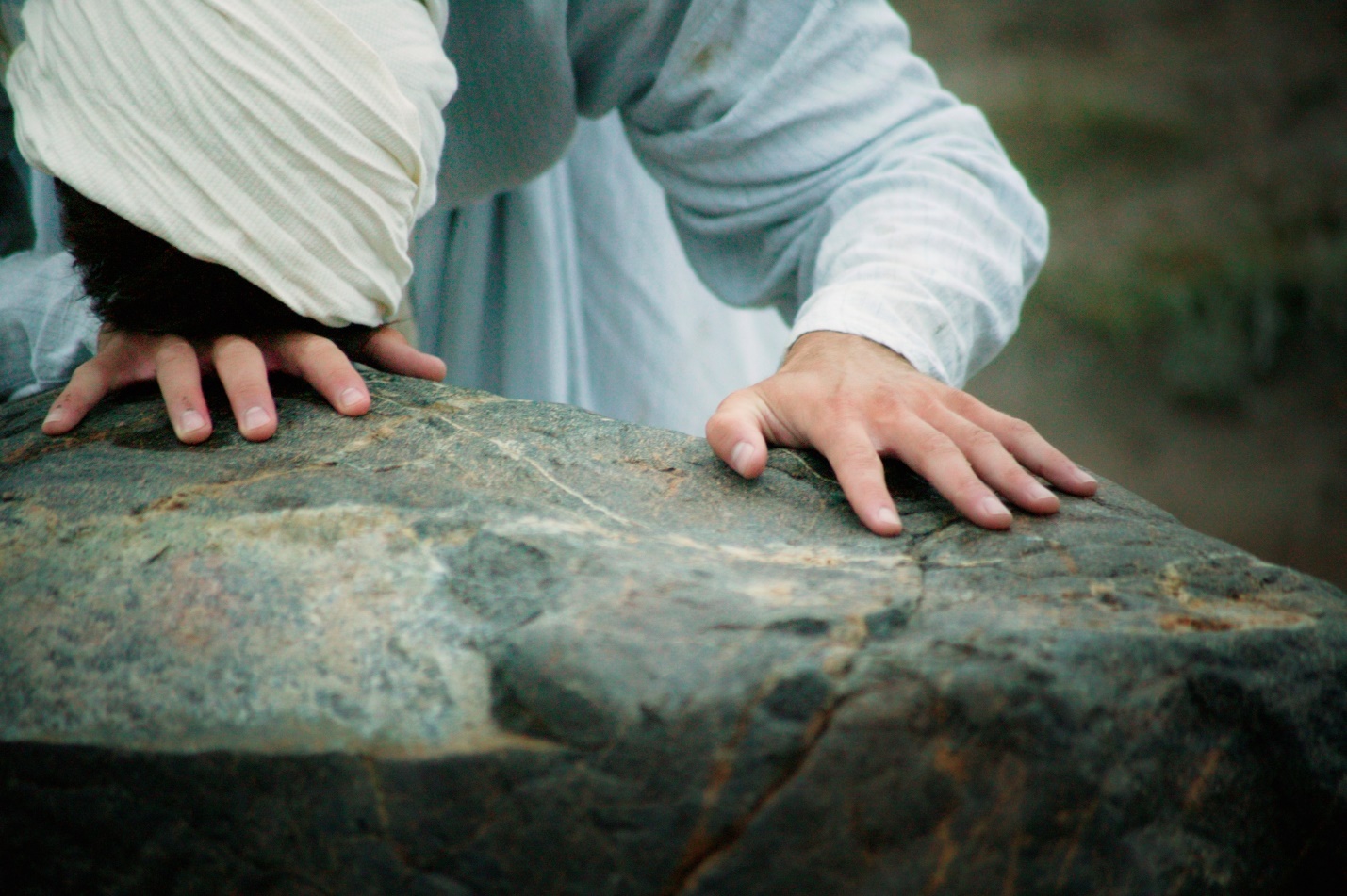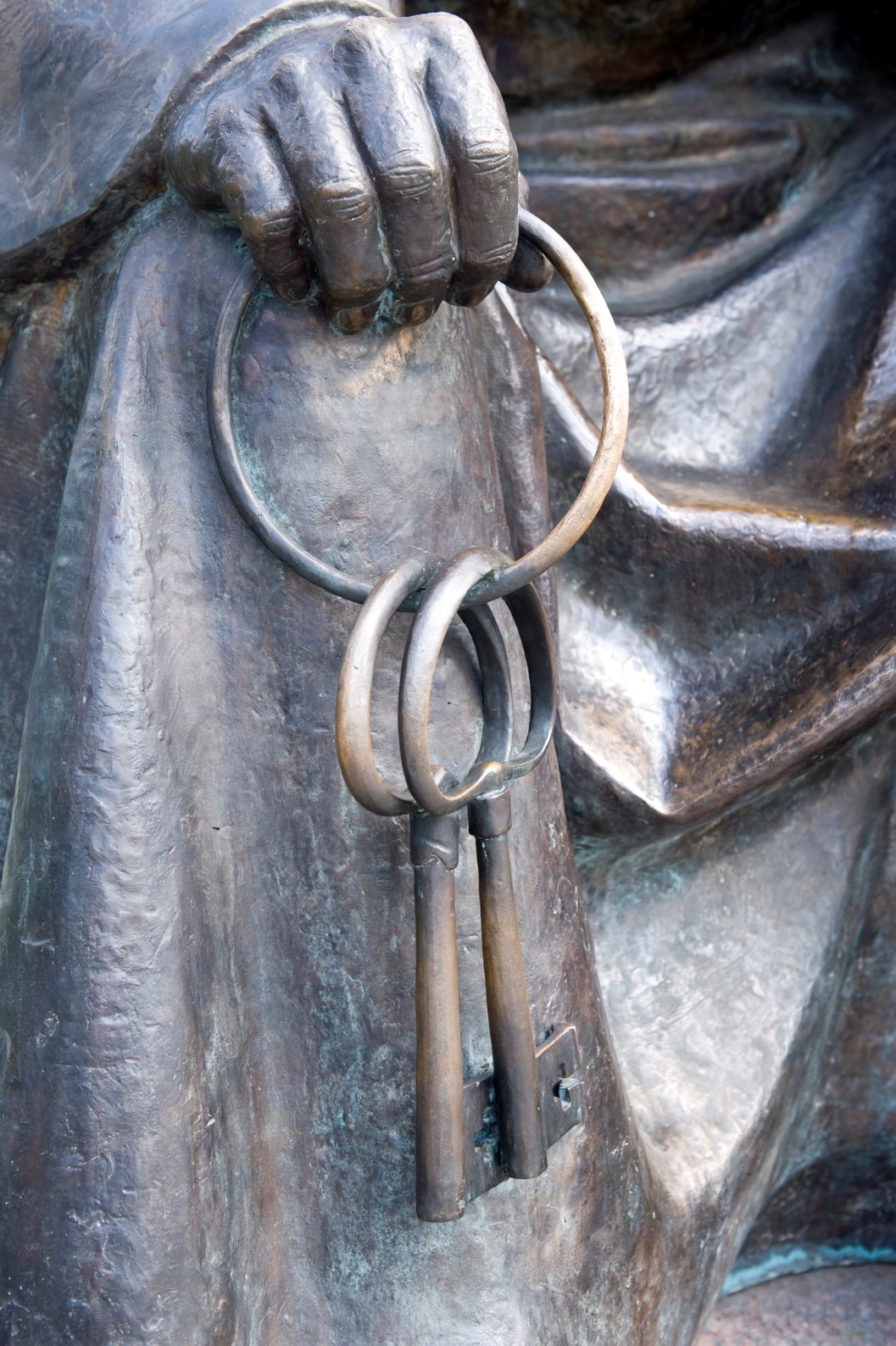BP67

Sometimes I hate my heart.
It feels too much, too deeply.
Especially at times of loss, death, and goodbyes.
Separations are absolutely a post-fall phenomenon, arriving after original sin entered the world. What were Adam and Eve thinking when they listened to Satan in the garden? Didn’t they count the cost? I suppose since they had never experienced loss and death in their perfect world, they had no way to anticipate what devastating fruit sin could bear.
When the first man and woman disobeyed God, they invited death and loss and separation into the good world that Jesus had created. Separation from God obviously was the primary consequence. The terrible one. Who can survive deep sea diving if they are separated from their oxygen tank? Even more so, it is impossible to navigate this world successfully without a personal relationship with our Creator.
When all of us turned our backs on God, we chose something over Him. We exchanged the glory of the immortal God for images and exchanged the truth about God for a lie and worshiped and served the creature rather than the Creator ~ Romans 1:23,25.
The result of this exchange was that we lost our status with God as our best friend. We were alienated from our Creator. We became strangers to our Father.
Our perfect bodies were riddled by sin and became vulnerable to death.
So began a parade of losses and goodbyes that would absolutely crush our hearts. The Garden of Eden was supplanted by the Valley of the shadow of death.
Late last night when it was dark and much of the world was asleep, our nine-year-old Golden Retriever, Summer, fell asleep in the final sense of the phrase. Once again, I tasted firsthand the curse of the Fall—the curse that keeps on giving. Or taking.
I hate how death takes people and beloved animals away. Death is greedy. Selfish. It is a thief. It is detestable.
Don’t let anyone ever tell you that death is a part of life. Nothing is further from the truth. That little pseudo-axiom is right up there with another phrase that people sometimes trot out during times of suffering: God doesn’t give you any more than you can handle. That’s not in the Bible. Maybe in the book of 2 Opinions. Just read 2 Corinthians 1:8,9.) Clearly, most days are more than we can handle so we are compelled to run to God for strength.

Life is right. Death is so wrong. As Ecclesiastes tells us, God put eternity into our hearts. We were created to live forever, and somewhere inside of us, we still know and experience that truth. Death crashed the party of life and interrupted it all. Yes, death is the Great Interrupter and has nothing to do with life. Like the Thief himself, death comes to steal, kill, and destroy.
It takes life away.
Our beloved Summer’s death was assisted. In other words, we had to take her to the animal hospital to be euthanized. Put down. Heart stopped with a medication injected through a catheter.
What made the end of her life so grievous was that she was still eating, wagging her tail, barking, and even playing and being affectionate. In so many ways, she was her normal self. However, the Hemangiosarcoma that was insidiously wracking and wrecking her body was putting pressure on her heart and leading to a massive buildup of fluid in her abdomen. Her ability to breathe was increasingly compromised.
Even worse, she could experience sudden and massive system-wide collapse at any moment.
How do you willingly bring your beautiful dog to the killing place when she is still so alive? I felt so responsible for her death. My wife and I walked her around the veterinary hospital parking lot for a while before we even entered that dreaded door. Were we doing the right thing, we wondered over and over? No, we’re not. Let’s go home. Let Summer live another night and avoid the dreaded feeling of the final goodbye.
Why did I ever agree to have another Golden after our previous retriever had been put down nine years earlier? Goodbyes hurt way too much.
I hate my heart.
Summer appeared so alive out there in that dark parking lot during her final walk, pulling against her collar as she walked. She was nervous, I could tell. It was like she knew . . .
More sadness. Oh, how it hurts.
In the end, we walked through the dreaded door just as the pizza delivery guy brought pizza to some hungry worker at the animal hospital. How ironic. Pizza that Summer would smell ten minutes before she died but never be able to eat.
Maybe it was a mercy from God—the pizza. One of Summer’s last smells was pizza. How amazing is that for a dog?
But it was so acutely sad that she would never eat again.

She was such a good dog—even in that dying room that would be the sunset of her life. (More tears). Although she was nervous, she hooked her paw onto my arm as she always did when she wanted to give and receive affection. She rubbed her nose against my hand and looked at me with her big, brown eyes. (Ugh). The worst of it all was her wagging tail.
It was one of those dreaded times when I didn’t want to be where I was, but I couldn’t leave. Reality has you there in that place. Death is coming and everything awful that accompanies it, but you can’t run. Oh, that’s not totally true. We could have taken Summer back home, but we had no idea when we would hear the dreaded sound of her gasping for breath as the fluid around her heart filled her lungs or further compromised her heart.
Everything in me wanted to leave, but I knew we needed to stay. How can death ever be the right thing to do?
Grief and dying and loss and separation and goodbyes—they are so physical. It’s not only the weeping. It’s also the hot waves that wash up your chest and into your throat like a material presence. It does not feel good. Not at all. No wonder people attempt to suppress and repress and medicate the pain of grief.
I remember as I sat stroking Summer’s head that I also felt a deep, throbbing ache. The ache wouldn’t be so painful if it could be contained in some type of reservoir, held behind some huge dam. But intense grief overflows the reservoir and crashes through the dam. It cannot be controlled. It inundates the heart.
I don’t like emotions that can’t be controlled. Frankly, I don’t like feeling out of control ever. Vomiting, flying in an airplane, feeling emotions that twist my face into expressions that feel so extreme–even embarrassing—all these experiences make me feel so out of control.
Have I mentioned that I hate my heart?
I believe God wants us to let go and trust Him with our pain and sorrow. He doesn’t want us to complicate our suffering by muting it or denying that it is happening or pushing it back down our throats. You must let go and let it come—yes, almost like vomiting.
As you know, here at DTFL, we talk a lot about using the Well instead of capping it and making everything come out sideways through Leakage or the Volcano. The Well is the way. Be transparent about what you feel and need instead of locking it up in the dungeon of your heart.
It was C.S. Lewis who said in his book, A Grief Observed, Aren’t all these notes the senseless writhings of a man who won’t accept the fact that there is nothing we can do with suffering except to surrender to it? Who still thinks there is some device (if only he could find it) which will make pain not to be pain? ~ p. 38.
The anesthesia was injected, and Summer soon became wobbly. I attempted to speak comforting words to her through a throat that was very tight with emotion.
We assisted her to lie down on the floor of the dying room. Actually, she collapsed and ended up lying in a position I had never seen her in before. It seemed so unnatural. Soon she became totally limp. She would never move again. She appeared to have died with her big brown eyes wide open.
But she wasn’t dead yet. The dreaded heart-stopper injection followed a few seconds later.

The Severe Mercy medication did its dreaded job and dear Summer stopped breathing. She was gone. Never to bark again. Never to wag her tail. Never to dance for a treat. Never to kiss me on the cheek. Never to roll her big eyes in my direction.
She was lifeless. I had never seen her lifeless before. It felt absolutely wrong. Death is not supposed to happen. Eternity is in our hearts!
My one consolation was that she had died so happy—and with those she loved. We didn’t just drop her off at the hospital and allow her to be put to sleep without us. It would certainly have been easier to do that, at least in one sense. The hard part is that I have the memory of those last two minutes etched in my mind now. But would I prefer to live with the memory of her being led away and dying apart from her loved ones? No.
We remained a minute longer in that terrible room, but why linger there? Although her fur was still soft and her ears warm, it was time to leave. She was gone.
Three of us entered the hospital. Two of us left. I had a leash and collar in my hand as I walked out to the car.
Ugh.
Oh, how I hate to write these words because to do so I have to go back to that room and remember what happened and then all the strong emotions come back. The ache and the hot wave and the tears. I am back there reliving it right now. The tight throat and the sighing and the difficulty breathing and the feeling of being so alone inside because everyone grieves differently and somewhat privately.
I think that’s part of what is so difficult about grieving a loss. You relive the pain every time you remember. But if you don’t remember and invite the wave of grief to crash through your heart, you cut yourself off from your own heart as well as the memories of the loved one (whether it be an animal or a beloved human).
Yes, there is some truth that over time as the emotions become less, a grieving person feels less sadness. At the same time, however, there is a growing sense that the deceased loved one is getting further away in memory and experience. In some ways, it is like losing them again. I do believe that some people will rehearse the memory of the loss so they keep the departed loved one from drifting away.
My pain feels too deep. After all, I’m talking about a dog, here, not a human being made in the image of God.
This grieving reminds me of a subconscious vow I made when I was young: don’t love anybody or anything too much because it hurts too much when they leave. They don’t even have to die for my heart to hurt so much. All they have to do is get on a plane and fly away and the dreaded ache is activated.
Is this deep grieving triggered by the death of a four-legged creature all because my father died before I ever met him? Is it simply due to a hypersensitive constitution? Does everybody feel things so deeply?
Death, of course, brings with it something that nothing else in this world does, namely, the hole.

When we returned home that night from the pet hospital (the killing place—no offense to vets intended), Summer was not in the house. In her place was a tangible emptiness. The Gaping Hole. What makes death so dreaded is that it is multi-factorial. Not only do you experience the suffering, the dying, the moment of death, and the deep sadness you feel for the others around you who are sad. You also go home and experience the loss. The absence. The silence.
The beloved is gone. Simply gone. Where in the world are they?
Death is so final. The loved one is so not there anymore. Someone who was there day in and day out is now missing. AWOL. Forever.
Of course, we see the dog bowls and the family room where Summer had barked feistily and smiled at us only an hour earlier. The physical cues are so present, and the memories linger in the air like a fragrance. I am a little embarrassed to say it, but I even called out her name just to irrationally confirm that she wouldn’t come running to rub against my legs–a dog who thinks she’s a feline.
We called her the Velcro dog because she so loved to attach to human bodies.
Why do we even grieve when someone dies? If we are all evolved animals that are here by accident, why do we even miss an animal, or especially another human? Why are we sad? Is it simply pain caused by the absence of something that had become familiar in our lives?
Or is it a utilitarian thing? We miss the animal or person for what they did for us or how they gave us pleasure? We don’t miss the loved one but only what they did for us?
I don’t think so. Not typically. Sometimes, maybe.
I believe it’s love that makes the heart ache at the loss of a precious being.
I believe it’s because a Creator God made us for relationship, to know an other and to be known. Yes, we were created for intimacy. It is our purpose. It is hard-wired into us. To not have it or to lose it creates pain within us. Why? Love for the beloved was meant to be there forever.
We were originally designed to live in that garden with our loving Triune God forever with no interruptions. But then disobedience came—sin and death. Everything fell. Nothing was spared. Now we, along with creation (Romans 8:18-25), groan inwardly as we wait eagerly for adoption as sons, the redemption of our bodies; when God will make everything right once again.
So, what direction do I go to end this post about death and goodbyes and suffering and grief? We could go down any one of a dozen paths.
We could discuss if the death of an animal is more difficult (at least in one sense) than that of a human because we know that the human, if a believer, will live again with us and God whereas we might believe that a dog is gone forever.

We could ponder if the intensity of grief accumulates over a lifetime which would explain why the loss of Summer was so difficult. (It dog-piled on the previous fifteen losses that preceded her death.)
We could talk about if there is such a thing as grieving too much. Can a person revisit and rehearse the memories around the suffering and death of a loved one to such an extent that it becomes unhealthy? (I do believe that can and does happen.)
To the contrary, we could speculate about how flying over the loss of a loved one and moving on too quickly is at least as unhealthy as overindulging oneself in memories of the dying and death.
I want to end with two thoughts different than the ones above. The first one is that walking through the dying and death (or some other type of parting) of a loved one offers an unusual season for listening and seeing on a level that simply does not (and cannot) happen when a person is living on the mountaintops of life.
Referring to the grieving around loss, C.S. Lewis writes, Nothing less will shake a man—or at any rate a man like me—out of his merely verbal thinking and his merely notional beliefs. He has to be knocked silly before he comes to his senses. Only torture will bring out the truth. Only under torture does he discover it himself ~ A Grief Observed p. 43.
There is no doubt that the hot fire of grief clears our mind of trivial things and forces us to think about what really matters in this world, on this side of eternity. Death has a way of putting things into perspective—if we only pause and listen.
What I would like to add to Lewis’ thought is that for a brief season before, during, and even after death, eternity and temporality meet for a short season. Heaven and earth intermingle. Mortality and immortality experience a brief confluence. These opposites do not overlap on a normal day, at least not to the same degree as when death and life interface in some type of spiritual Tango. So, be extra open to hearing from God during such a unique time.
I believe that my deepest glimpses into the meaning of the universe and the character and presence of God occurred during a twelve-month period of my life when I experienced four acute losses—five if you count the dog we had before Summer. Rarely, if ever, has my pain been so acute, so concentrated into such a narrow window of time. Rarely have I felt like I saw things so clearly, like I was granted a brief glimpse behind the curtain.
So, when losses come into your life, pray that God will give you spiritual ears and spiritual eyes because you will hear and see things you normally would not comprehend. These moments speak of the truth of 1 Corinthians 2:6-16.
But you will need to lean into the suffering instead of medicating it or fleeing from it.
The final thought, and the most important one by far, comes from John 11. The occasion is Jesus’ journey to visit Mary and Martha four days after their dear brother, Lazarus, had died. What does Jesus do in the presence of death, and loss, and deep grieving, and The Gaping Hole?

He does two things. He weeps for Mary and Martha when He sees their grieving faces and hears their sobs and moans. He sympathizes with the children of flesh and blood as we are told in Hebrews 4:15 and 2:14.
He also is deeply moved in spirit.
Concerning Jesus’ weeping, I pull in the words of Dane Ortlund from his book Gentle and Lowly where he says, It is in ‘our weakness’ that Jesus sympathizes with us. The word for ‘sympathize’ here is a compound word formed from the prefix meaning ‘with’ . . . joined with the verb ‘to suffer’.
‘Sympathy’ here is not cool and detached pity. It is a depth of felt solidarity such as is echoed in our own lives most closely only as parents to children. Indeed, it is deeper even than that. In our pain, Jesus is pained; in our suffering, he feels the suffering as his own even though it isn’t . . . . His is a love that cannot be held back when he sees his people in pain ~ p. 46
Jesus meets Mary and Martha in the suffering of their loss, their grief, and their experience of The Gaping Hole. He feels it with them. So, he weeps. He similarly weeps with us when we reap the bitter fruit from the fall into sin and death. He suffers with us when we experience agony at the dying and death of a loved one. We are never alone in our darkest moments.
John also tells us that Jesus is moved deeply in his spirit (twice he repeats these words) and greatly troubled. About this experience of Jesus, John Calvin writes in his commentary, Christ does not approach the sepulcher as an idle spectator, but as a champion who prepares for a contest; and therefore we need not wonder that he again groans; for the violent tyranny of death, which he had to conquer, is placed before his eyes.
I believe this text and Calvin’s commentary are telling us that Jesus is moved deeply in his spirit (the verb carries a sense of indignance or anger with it) because of the encounter with death he will immediately face at the resurrection of the one (Lazarus) but also because, days in the future, he will be laying down his life on the cross to defeat death forever for the many.
Because of Jesus, one day there will be no more dying. No more death. No more tears. No more loss. No more Terrible Gaping Hole. But He had to pay a terrible price to win that victory—His own dying and death.

Even though I felt deep pain at the death of Summer, I always knew in the deepest place of my heart that death does not have the final word. Jesus does. The crucified and risen Christ himself announces in Revelation 1:17ff, Fear not, I am the first and the last, and the living one. I died, and behold I am alive forevermore, and I have the keys of Death and Hades.
Jesus is the answer for the critical questions in this world. Jesus works. If you do life without Him, you are not doing life at all but treading water until you die. He is the master cylinder, the crux of it all. Life is built around Him, not Him around it. Life flows from Him. He is its Creator and Sustainer (Colossians 1).
The main question that remains for me about life and death is, How do people live without Jesus? Why would they want to? The benefits of His Presence are too necessary to daily life. We’re not talking empty or perfunctory religion here. We’re talking about a God who is with you all the time. Even though we may sometimes feel like He’s so far away, those who have trusted Him for years always know that He is there—even in the darkest valleys.
When you encounter dreaded grief, picture Jesus outside the tomb of Lazarus. Remember His tears and his indignant groaning. Somewhere inside His heart at that moment of agony, He was smiling, I believe, because He knew. He knew that soon He would destroy the one who has the power of death (Hebrews 2:14). He knew He was going to make all things right.
I guess I don’t hate my heart, after all.
If the Creator of everything weeps and is moved deeply in spirit, I am a fool to divorce myself from my heart. How comforting it is to me that Jesus knows my suffering–and yours–and suffers with us in our grief. Yes, He is with you on the mountaintops and in the valleys of the shadow of death. How critical, then, not to hide our hearts, but to bring them to Him.
Also, to feel is to be alive; to be who God created me to be. Alive and needing Him in my pain. I want to live life abundantly (John 10:10) and not allow Satan to steal my emotions, kill my heart, and destroy my intimacy with Jesus in times of agonizing grief.
I don’t know if Summer is gone forever or if she will reappear when Jesus creates not only the new heavens but the new earth. Maybe someday I’ll see her running over the crest of some hill bounding toward me.
Far more importantly, in heaven I will see my family and friends and Moses and Abraham and Lazarus and Paul and Talitha and Mary and Martha and—Him. The glory of the universe. What a day that will be. I live for that day and am willing to die for it.
If Jesus wants Summer in heaven, she will be there. I will trust the kindest Being in the universe with that decision.
It really is all about trust—and seeking His Presence from that position of trust. In our deepest, breathtaking grief, we need to know that He sympathizes with our pain, that He holds us, that He will never leave us alone.
So, we run to Him.

The name of the Lord is a strong tower. The righteous man runs into it and is safe ~ Proverbs 18:10
Behold, the dwelling place of God is with man. He will dwell with them, and they will be his people, and God himself will be with them as their God. He will wipe away every tear from their eyes, and death shall be no more, neither shall there be mourning, nor crying, nor pain anymore, for the former things have passed away. And he who was seated on the throne said, ‘Behold, I am making all things new’ ~ Revelation 21:3-5
Jesus is bringing a new Summer that will never end.
He will walk with us there . . . forever.
